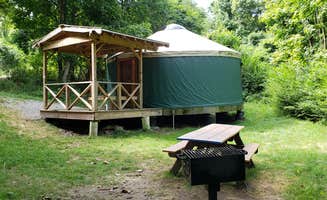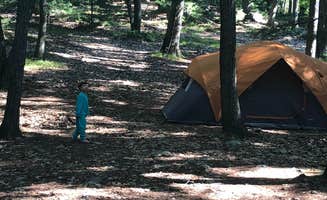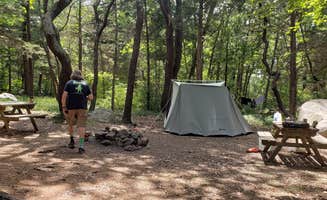Limited primitive camping exists around Dover, Massachusetts, with most options being established campgrounds within 30-40 miles. The camping season typically runs from May through mid-October, with July and August being the busiest months. Winter camping is minimal due to New England's cold temperatures and frequent snowfall.
What to do
Historical exploration: At Boston Harbor Islands State Park Campground, campers can investigate old forts and military structures. As one visitor noted, "The island is beautiful and has an old fort to explore as well as a lot of Rocky shoreline and trails. You can build bon fires and see gorgeous sunsets."
Swimming and beach time: The campgrounds near Dover provide beach access for summer recreation. A visitor to Cape Ann Camp Site mentioned, "Beach down the street was big, beautiful and low tide was unexpected as you could walk for ever."
Wildlife observation: Many camping areas feature opportunities to see local wildlife. A Cape Ann visitor reported, "Spectacular views and wild turkeys, deer, etc." The wooded settings provide natural habitats for various New England wildlife species.
What campers like
Island isolation: Campers appreciate the remote feel of island camping options. According to one Boston Harbor Islands visitor, "Camping at Boston Harbor Islands requires some planning, but you get the benefit of a remote island with minimal company."
Wooded privacy: The campsites at Buck Hill Campground offer dense forest settings. A reviewer described it as "heavily wooded without much else around and very few amenities... This is the type of campground to just come and unwind, fish, cook, etc."
Water recreation: Many sites offer pond or lake access. A Buck Hill camper noted, "many of the sites are also along Wakefield Pond (big enough lake for canoe/kayak/etc. The area is heavily wooded without much else around."
What you should know
Transportation logistics: For island camping, detailed planning is required. One Boston Harbor Islands camper advised, "Getting to the island was a bit of a hassle. We live in Boston and took all of our gear on the T to the harbor by the aquarium. We then took the ferry to Georges Island. After that we waited and got on a much smaller island to Lovells."
Reservations timing: Popular sites book up quickly in the summer season. A visitor noted about Boston Harbor Islands, "These sites book quickly, so you should try to book 7 months to the day in advance. That said, you can also look for last minute openings."
Water availability: Some campgrounds require carrying in all water. A camper warned, "Make sure that you bring enough drinking water and that you are ok with using the composting bathroom or going in the woods."
Tips for camping with families
Educational opportunities: Camp Nihan Education Center provides learning experiences in nature. A family camper shared, "The camp is also adjacent to Breakheart Reservation, which had a great shallow pond with life guard on duty as well as bike trails and a range of different hikes."
Short distance camping: Families with young children can find sites close to Boston. One parent noted about Camp Nihan, "All of this right in Saugus MA, less than 30 minutes from Boston."
Junior Ranger programs: Children can participate in educational activities at certain sites. At Boston Harbor Islands, campers can "earn a Junior Ranger badge from the National Park Service, fly a kite, or go for a swim or kayak."
Tips for RVers
Size limitations: Large RVs may find limited options near Dover. At Cape Ann Camp Site, a visitor mentioned, "We paid $60 a night for a 30 amp spot with water." The campground accommodates RVs but with limitations.
Site conditions: RVers should research the ground surface at potential sites. One camper at Cape Ann Camp Site observed, "The sites are all dirt. There is no concrete pads."
Proximity to stores: Many campgrounds offer limited on-site supplies. A Cape Ann camper noted, "There is a nice little store on-site for anything you forgot. It is also close enough to stores if you need more."




